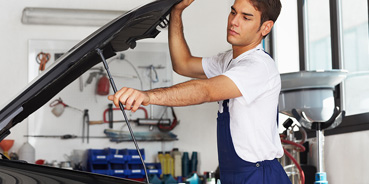Tel: +1 610 444 4158
961 West Baltimore Pike, Kennett Square, PA 19348
Why is Maintenance Important
Maintenance is the routinely scheduled services, inspections and part replacements that your vehicle manufacturer recommends based on the age or mileage of your vehicle.

When you purchase a new or used car, you will receive a booklet with detailed maintenance schedules for you to follow. Today's engine has advanced, but there are still details that should be checked regularly. Keeping your car well maintained is the key to preventing breakdowns in dangerous or remote areas. Brake inspections, fluid level checks, oil changes, tire inflation checks, belt checks, and inspection of lights are important.
Proper maintenance should be performed every 3,000 miles. Some times these checks will involve only an oil change. Other times, a more complex check of items including gauges, sensors, and belts is required. You should have your vehicle checked before heading off on vacation.
You should always have your oil changed every 3,000 miles. This prevents build up of sludge and grime. With a properly lubricated engine, you are virtually guaranteed that the engine will not seize. Consider going to a station that not only changes your oil but also performs safety checks. These stations will check brakes, tires, fluids, lights, and more for you. It may cost a little more, but it can save you from trouble in the future.
Every 7,000 miles, it is essential to have your tires rotated. This keeps tire treads from wearing irregularly. Tires will last longer. Check treads by placing a penny into the tread mark. Proper tread depth should come to the top of Lincoln's head.
Check for uneven wear, bulges, and holes. When purchasing new tires, find locations that offer free tire rotations to all customers. This can save you plenty of money in the future.
All fluid levels (brake fluid, transmission fluid, oil, power steering fluid, and antifreeze) should be checked every 3,000 miles. This can help clue you in to slow leaks.
Once a year, you should have your radiator flushed and refilled. This can prevent radiators from developing holes prematurely.
Always make sure you have a full windshield fluid tank. Clean windows can be the key to preventing some accidents. At the same time, you should replace your windshield wiper blades twice a year. This is especially true in areas where winter grime will be getting onto your car. Dirt can cause blades to wear quickly.
Headlights, turn signal lights, brake lights, and parking lights should all be working. Turn on your lights and then walk around the car to make sure all of these lights are working. If they are not, replace the blown bulbs. This can prevent others from rear ending you. Properly working lights are important to preventing accidents.
Every few months, you should check all seat belts for frays, twists, or rips. In the event of an accident, a worn seat belt could fail causing you permanent injury or even death.
Taking the time to ensure your car is working properly is not hard. It can keep you safe, however, so do not fail to provide proper upkeep on your vehicle.